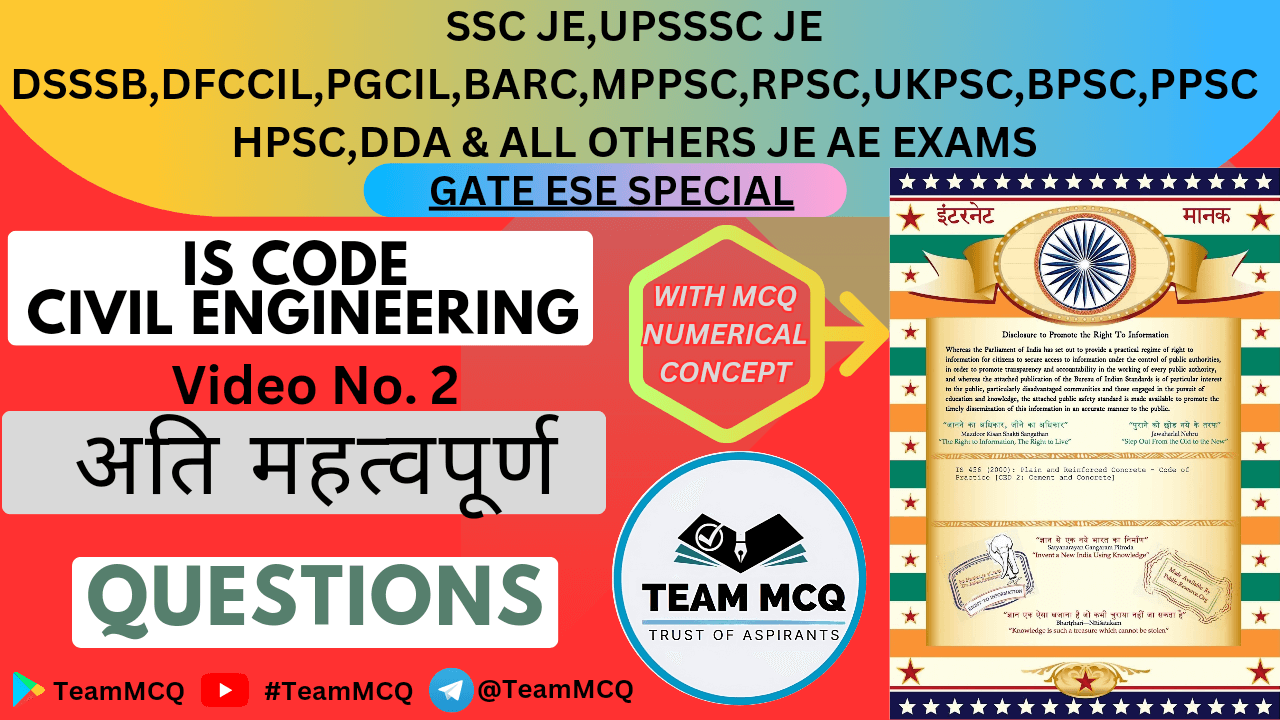Hello Everyone in this article we are going to be disscus IS 516:1969 important Questions asking in different interview and Government Jobs exams. You can Read Previous Article for IS 456:2000 IMPORTANT QUESTIONS https://teammcq.com/is-code-important-questions-in-civil-engineering/
IS 516:1969
The Indian Standard Code IS 516:1969 provides methods of tests for the strength of concrete. Here are key questions and one-liner answers covering essential aspects of IS 516:1969 in the field of civil engineering.
General Overview
- What is IS 516:1969?
- IS 516:1969 is the Indian Standard Code for methods of tests for strength of concrete.
- What is the primary purpose of IS 516:1969?
- To specify the methods for testing the compressive, flexural, and tensile strength of concrete.

Compressive Strength
- What is the standard size of a concrete cube for compressive strength testing?
- 150 mm x 150 mm x 150 mm.
- How should the concrete cubes be prepared for compressive strength testing?
- Cast in steel or cast iron molds, compacted properly, and cured in water at 27±2°C.
- When should the compressive strength test be conducted?
- Typically at 7 days and 28 days after casting.
- What is the loading rate for compressive strength testing?
- 140 kg/cm² per minute.
Flexural Strength
- What size of concrete beam is used for flexural strength testing?
- 150 mm x 150 mm x 700 mm or 100 mm x 100 mm x 500 mm.
- How is flexural strength of concrete tested?
- By applying a load at the third points of the beam span until failure.
- What is the standard span length for a beam in flexural strength testing?
- Three times the depth of the beam (450 mm for a 150 mm deep beam).
- What is the loading rate for flexural strength testing?
- 1.8 kN/min for the 150 mm specimen and 0.4 kN/min for the 100 mm specimen.
Tensile Strength
- What method is used for testing the tensile strength of concrete?
- The splitting tensile test.
- What is the specimen size for the splitting tensile test?
- Cylinders of 150 mm diameter and 300 mm length.
- How is the splitting tensile test performed?
- By placing the cylinder horizontally between the loading surfaces of a testing machine and applying a compressive load along the vertical diameter.
- What is the loading rate for the splitting tensile test?
- 1.2 to 2.4 MPa/min.
Preparation and Curing
- How should molds be prepared before casting concrete for tests?
- Cleaned, oiled, and assembled tightly to prevent leakage.
- What is the standard curing temperature for concrete specimens?
- 27±2°C.
- For how long should the specimens be cured before testing?
- Typically 7 days, 28 days, or as specified.
Testing Machine
- What type of testing machine is used for compressive and tensile tests?
- A hydraulic compression testing machine.
- What are the accuracy requirements for the testing machine?
- The machine should be capable of applying loads uniformly and accurately as per the specified rates.
Interpretation of Results
- How is the compressive strength calculated?
- By dividing the maximum load applied by the area of the specimen.
- What does a compressive strength test result indicate?
- The ability of concrete to withstand axial loads.
- How is flexural strength expressed?
- As the modulus of rupture, which is calculated based on the maximum load and dimensions of the beam.
- What does the tensile strength test determine?
- The resistance of concrete to axial tensile stress.
Miscellaneous
- Why are standard testing methods important?
- They ensure consistent and reliable results, allowing for quality control and comparison.
- What safety precautions should be taken during testing?
- Proper handling of specimens, ensuring the testing machine is calibrated, and following safe loading procedures.
These questions and answers provide a concise overview of IS 516:1969, highlighting its critical aspects in testing the strength of concrete in civil engineering.
SSC JE IMPORTANT IS CODE
In SSC JE IS CODE QUESTIONS FREQUENTLY ASKING YOU CAN DOWNLOAD TEAMMCQ APPLICATION FOR GETTING TEST SERIES.

How to make Short Notes
You can Read our Artical for making short Notes surely it help you for making short notes for quick Revision.




